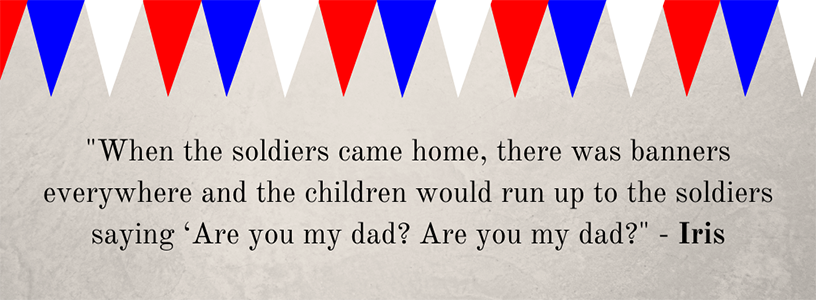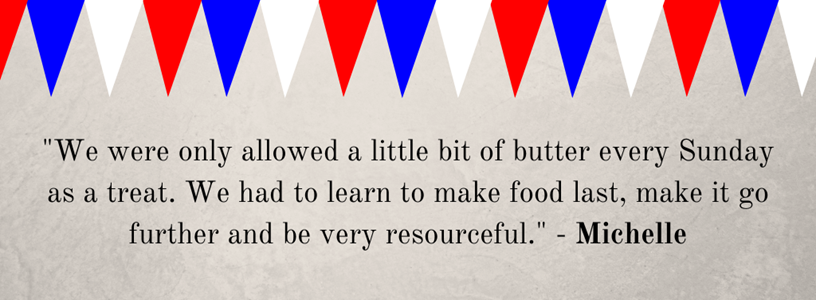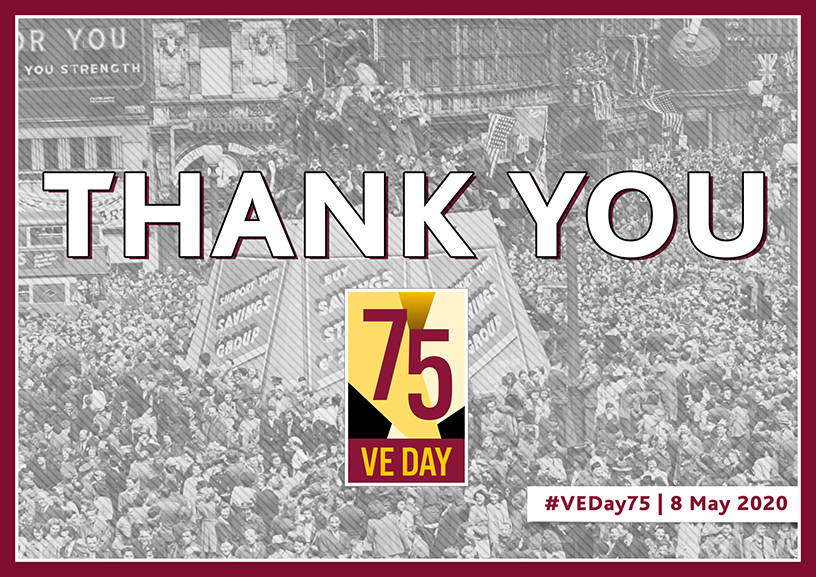Despite social distancing measures in place, people across the UK are still determined to commemorate the 75th anniversary of VE Day, which marks the end of fighting against Nazi Germany in Europe during World War Two.
Many of our residents lived through the Second World War and have fascinating experiences to share. Read Iris's and Michelle’s stories:
"I remember my dad going off to war. Mum didn't know she was pregnant when he left, so she had me (Iris, 4) and John (2) with another baby on the way. I then didn't see my father for six years."
School
"I went to school in Brentwood. I had to walk up a big hill - there were no buses in those days! You never knew if you were going to be at your desk, under your desk or in the bomb shelter at school."
Home life
"The bomb shelter was made of corrugated iron and the one in our garden had water up to your knees in it. You never knew when you were going to be dragged out of bed in the night to go into the shelter because the sirens were going.
My brother and I moved in with our grandmother who lived right near the Royal Albert Docks in London. There was no TV or radio, Grandma taught us all to knit."
Iris is very creative and a fantastic knitter. She has made wedding cakes, she knits, crochets, has done flower arranging for weddings, as well as making wedding and bridesmaid dresses.
"When you went down to the shop, if there were planes about, you would have to be ducking in and out all the way".
Iris remembers hearing that there were oranges in Romford, so for two miles she had to run along the pram to get there. When they arrived, they got in any queue they could and took whatever they could get.
"When you saw planes being shot down, you would see the pilot in his parachute and would watch them get taken out. The kids would argue with each other that it was their dad who shot the plane down."
Iris remembers her dad sending them a chocolate bar. They didn't know what it was as they hadn't had them before. She still doesn't eat much chocolate now, it just wasn't part of her life for such a long time.
Evacuation
At approx. six years of age, Iris was evacuated with her brother. She was evacuated from Romford Station on steam trains. The kids were put in the back of the train and the mothers were in the front. They were told they were all going to the same place, but her mother was sent to Leicester and her and her brother ended up in Suffolk.
They stayed with a lady who didn't like boys. She said 'boys wet the bed' and made Iris' little brother sleep on the floor. Iris remembers a boy next door having to sleep outside because he had the measles.
They were taken in ambulances for the evacuation transport. Iris got in trouble for having food - her mum always made sure that they had sandwiches. Her mum made all her clothes; straw hat, gloves, little handbag, and then during time in evacuation she would be dressed in whatever. When the lady had visitors, the kids were not allowed in the house, they had to be in the garden.
Reuniting the family

Iris doesn't remember how long it was until her mum found her and they were able to move to Leicester to be with her. Her mum had been sent to stay with a Doctor.
"When the soldiers came home, There was banners everywhere and the children would run up to the soldiers saying, Are you my dad? Are you my dad?"
Iris doesn't remember her dad coming back different. He was a very tall man and a regimented sergeant. He was good. Once they were allowed, they returned to the house. Some of their neighbours and friends had no home to go back to. Friends behind them were bombed out.
After the war
Iris can remember her mother making meals out of nothing, using Oxtail Soup Squares and adding something like a potato to try to make it a meal. The worst thing was whale meat sausages, she said.
"The smell was awful and you could smell it up and down the street because it was all there was to eat."
"There weren't any benefits or help at that time. The nice thing is, you all lived close together; aunt, grandma, whole family only a few streets apart usually."
"I had an Uncle Ray who was lovely and was 11 years older than me. He was a 'Bevin Boy' named after Ernest Bevin. 18-25-year olds were sent down the mines. I think this was because they were considered not to be in the best of health. He sadly passed away."
Iris told us that her mum and her grandma looked exactly like the Queen, she has lots of pictures.
VE Day memories
"I was eight or nine and I remember being lifted so I was able to see everything that was happening. I remember it being very busy, very loud, very happy.
"I can't believe I saw such amazing parts of history. I was watching VE Day on the telly and it makes me cry. I'm looking out for me on the screen!"
Michelle's father was at sea when the war broke out. He had no idea where he'd be stationed. Michelle was around seven years old at the time.
Sadly her father was killed at Dunkirk where he was taken prisoner. To add to the family's grief, the family home was bombed about two weeks later. The six of them were blown through the air raid shelter but escaped without injury.
Help from family
Their grandparents were based in Yorkshire. They were farmers and stepped in to help the family as much possible.
Michelle and her siblings were sent to various boarding schools, again with financial assistance from family members (grandparents and uncles). They returned home at weekends.
Rationing

Michelle's mum was left with a small fixed income - soldiers' pensions were not worked out or in place. So the family struggled with rations, and had to rely on locally sourced vegetables, meat and eggs. Michelle explained how the family had to make a block of butter last all month.
"We were only allowed a little bit of butter every Sunday as a treat. We had to learn to make food last, make it go further and be very resourceful."
Their grandfather would do his best to top up with rations for the family.
4pm sirens
Michelle explained that children knew they had to run home or to the air raid shelter as soon as the sirens started sounding off at 4pm.
"Everyone would run without hesitation. However, there was an additional threat of the 'silent bombs' as they could only be heard they they were about to drop. There were some real tragedies, such as homes being bombed and wedding plans shattered."
Michelle has a vivid memory of wedding dresses on display after homes were bombed.
Although this was a great tragedy, Michelle described life as exciting. Michelle and her siblings needed to learn to stick together and share things equally.
Michelle's outlook on life
Despite the apparent hardship Michelle and her family had to endure, she has an amazing approach to life and her outlook is continuously positive.

